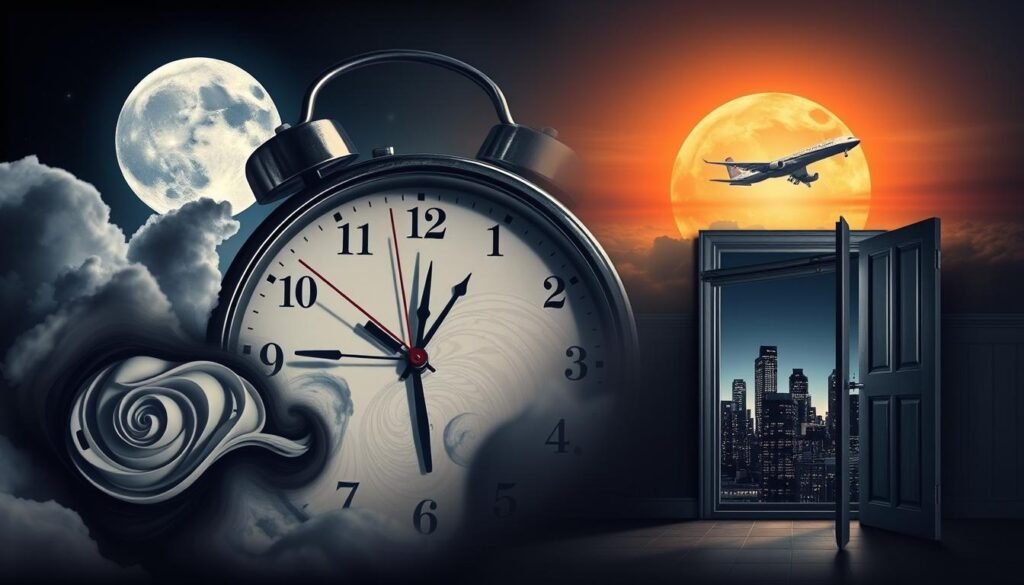Did you know that more than 70% of adults in the United States don’t get enough good sleep? This reveals an important health issue: disruptions in the circadian rhythm. The circadian rhythm, or the body’s biological clock, controls key functions. These include the sleep-wake cycle, hormone production, and metabolism. Knowing about these rhythms is key. When they are off, people can face various health issues that affect their daily life and overall well-being.
Shift workers and frequent travelers often deal with these disruptions without knowing. Almost 20 million people in the U.S. face shift work-like conditions. It’s important to understand the effects of these disturbances. Managing the circadian rhythm well can make sleep better and improve health. Knowing the causes, symptoms, and how to treat them is vital.
Key Takeaways
- Disruptions in the circadian rhythm can severely affect sleep quality and daily function.
- Over 70% of U.S. adults experience poor sleep due to misaligned biological clocks.
- Shift work and irregular schedules significantly increase the risk of circadian rhythm disorders.
- Sunlight exposure and daily exercise play vital roles in maintaining a healthy sleep-wake cycle.
- Effective management of circadian rhythms can enhance overall health and reduce chronic disease risk.
Understanding Circadian Rhythms
Circadian rhythms are natural cycles that happen about every 24 hours. They help control our sleep-wake patterns and other body functions. This internal clock is in the brain and helps keep us running smoothly all day.
Getting sunlight is key to keeping our circadian clock on track. Too much light at night, though, can mess it up. When our sleep cycles are off, we might face health problems like obesity, diabetes, or depression. It shows how crucial a balanced circadian rhythm is. For more details, you can visit this research.
Jobs that require working in shifts can upset our circadian rhythms. People with shifting schedules often find it hard to keep a regular sleep routine. This leads to tiredness and less sharpness.
Disorders like Delayed Sleep Phase Disorder and Advanced Sleep Phase Disorder show the tight link between our schedules and internal clock. These issues reveal the challenges of matching personal schedules with our biological needs.
Understanding circadian rhythms helps us see how daily habits and the environment affect our health. Knowing about our natural 24-hour cycle aids in making better life choices for healthier living.
Importance of Circadian Rhythms on Health
The circadian rhythm significance involves more than just sleep. It’s key to our overall health, managing sleep, hormone levels, and digestion. When thrown off balance, our health can suffer greatly. For example, a disrupted rhythm can affect gene behavior in cancer cells. This may increase the risk of lung, liver, and breast cancers.
Imbalances in our biological clock are seen as possible cancer triggers by health experts. These disturbances lead to metabolic and digestive issues, and sleep problems. Continuous disruptions are linked to chronic health conditions.
It’s important to keep a regular sleep schedule. Adults need 7 to 9 hours of sleep for their biological clocks to work properly. Lack of sleep affects our mood, causing anxiety and irritability. For more on sleep’s impact on mood, check out this link about sleep deprivation and mood.
Circadian rhythms also play a part in our metabolism. They can affect our weight, insulin levels, and when we eat. Time-Restricted Feeding (TRF) offers a way to fix these issues by aligning eating times with our natural clock.
| Health Aspect | Impact of Circadian Rhythm Disruption |
|---|---|
| Sleep Quality | Increased risk of insomnia and sleep disorders |
| Metabolic Health | Higher chances of obesity and insulin resistance |
| Emotional Well-being | Higher anxiety, irritability, and mood swings |
| Cancer Risk | Connection to various cancers through gene expression |
Disruptions in the Circadian Rhythm
Circadian rhythms control important functions like sleep-wake cycles, temperature, and immune responses. Learning about what causes disruptions can help people manage their sleep better. Disruptions can be due to irregular sleep, shift work, or change in light exposure.
It’s key to know these factors to enhance sleep and overall health.
Common Causes of Disruptions
Several things can mess up our circadian rhythms, affecting our health. Non-traditional work hours or unpredictable daily routines often lead to irregular sleep. Shift work and jet lag mess with our natural light and dark cycles.
Light, meals, and exercise can also disrupt our body’s rhythms.
Effects on Sleep and Daily Activities
Circadian rhythm disruptions can seriously affect our sleep. People might face insomnia or feel extremely sleepy during the day. These sleep issues can stop us from doing our best in day-to-day tasks.
It can make it hard to think clearly or stay on task. Mood swings and social problems can happen, along with serious health issues like heart disease.
| Cause of Disruption | Effect on Sleep Quality | Impact on Daily Activities |
|---|---|---|
| Shift work | Increased risk of insomnia | Decreased productivity, fatigue |
| Travel across time zones | Jet lag, difficulty falling asleep | Impaired cognitive function |
| Irregular sleep patterns | Difficulty achieving restorative sleep | Emotional and social challenges |
| Light exposure | Disruption of melatonin production | Increased stress and anxiety levels |
Types of Circadian Rhythm Disorders
Circadian rhythm disorders mess with our natural sleep-wake rhythm. They impact our day-to-day activities and how we feel overall. Knowing the different types can help spot signs early and get the right help. Here are some common ones and the issues they present.
Delayed Sleep-Wake Phase Disorder
People with this disorder are often called “night owls.” They sleep and wake up much later than what’s typical. This is seen a lot in teens and young adults. It makes waking up for morning tasks tough and leads to feeling super tired during the day.
Advanced Sleep-Wake Phase Disorder
This one’s the opposite—causing super early sleep and wake times, often in older adults. One might crash at 6 p.m. and be up before the sun. It makes hanging out at night hard and messes with a normal daily routine.
Irregular Sleep-Wake Rhythm Disorder
This disorder means sleep is all over the place—no set schedule. It’s common in folks with some brain conditions. It chops sleep up into pieces, throwing off the body’s internal clock.
Shift Work Sleep Disorder
Up to a third of shift workers get hit by this disorder. Their sleep schedules don’t match their work hours, causing major tiredness. Fixed night shifts are somewhat easier to handle. But having a constantly changing shift really jumbles up sleep.
Jet Lag
Jet lag kicks in after fast trips across time zones. It leads to feeling wiped out and having trouble sleeping. Going east is tougher than west because it forces our sleep earlier, which is harder on our bodies.

Symptoms of Circadian Rhythm Disorders
People with circadian rhythm disorders face many challenges in daily life. They often feel very sleepy during the day. This sleepiness affects their work and life quality. Many struggle with poor sleep quality that leads to ongoing sleep disturbances.
They find it hard to stick to a regular sleep schedule. This results in unpredictable sleeping times. Difficulty maintaining a sleep routine often follows.
Those affected may also have problems with focus and remembering things. Mood changes are common too, including feeling irritable or anxious. Some even experience digestive troubles. Together, these symptoms of circadian rhythm disorders heavily impact mental and physical well-being.
It’s vital to recognize these symptoms early. Knowing about them can push people to get the help they need. Early action improves the chance for better sleep habits.
Impact of Light Exposure on Circadian Rhythms
Light is the biggest environmental cue that affects our body clocks. It does more than help us see; it also plays a key role in sleep and hormone levels. If light exposure doesn’t follow a natural pattern, it may mess up our body’s rhythms. This can increase disease risk.
Research shows that light at night can reduce melatonin and mess up our body clocks. This problem could lead to faster tumor growth and higher death rates. Shift work makes this issue worse because it involves being in artificial light at night. This puts workers at a higher cancer risk, like breast and colon cancer.
The International Agency for Research on Cancer labels shift work that messes up body clocks as a likely cancer cause. Gadgets like phones and tablets used before sleep can harm melatonin levels. This can delay sleep and cut sleep time, especially in teens and young adults.

Natural and artificial light are very different in strength. Direct sunlight is way brighter than office lights. The huge difference in light levels plays a big part in controlling our body clocks. Daylight’s unique spectrum greatly influences our internal clock.
Artificial lighting has changed how we experience natural light. Over 80% of people worldwide live in areas with too much artificial light. This makes it hard to keep a normal body clock. Different kinds of artificial lights affect our body clock in various ways. We need more research on this.
As we use more artificial light, the effect on our mental health and sleep is becoming clear. There’s a link to more depression cases. Changing how and when we’re exposed to light could help fix our body clocks. It shows why we need to pay attention to light exposure.
The Role of Melatonin in Circadian Rhythm
Melatonin is key for good sleep, telling our body when it’s bedtime. It’s made more at night to match our natural sleep cycle. Keeping this hormone balanced is crucial for a healthy sleep pattern.
When our sleep cycles are off, melatonin production drops. This can affect our health badly. Low melatonin might even connect to Alzheimer’s disease early on. So, it’s important for our minds and sleep quality to keep melatonin levels right.
Melatonin helps our brain rest during sleep, working with brain areas like the DMN. Giving melatonin can lessen the brain’s alert signals at night, helping with sleep. This is why it’s used for fixing sleep issues from travel or odd work hours.
- Melatonin treatment helps with a lot of sleep problems.
- Small doses (1 to 3 mg) work best for late sleepers.
- For jet lag, higher doses (5 to 10 mg) are better.
Light affects how much melatonin we make, especially artificial light like from screens. This can mess with our sleep and hormone levels. As studies go on, knowing how melatonin ties into our sleep cycle is key to staying healthy.
Stress Management and Circadian Rhythm
In today’s busy world, managing stress is key, especially since it can harm our sleep. Knowing how stress impacts sleep helps us improve our sleep health and fix our circadian rhythms. By using stress-reducing techniques, we can lessen sleep problems and bring back natural sleep cycles.
How Stress Affects Sleep Patterns
Stress causes changes in our bodies that make sleep hard. It raises cortisol, a stress hormone, messing up our sleep patterns. High cortisol keeps us awake at night, fighting our natural urge to sleep. This battle leads to a cycle of bad sleep raising stress, which then harms sleep more.
To beat this issue, there are ways to manage stress and sleep better:
- Mindfulness Meditation: This helps calm us down, making relaxation and emotion control easier.
- Physical Activity: Exercise fights stress. Staying active helps keep cortisol in check.
- Cognitive Behavioral Therapy (CBT): This method teaches us to shift our negative thoughts, lowering anxiety and enhancing sleep.
- Establishing a Routine: Keeping regular sleep times supports our internal clock, making stress less impactful on sleep.
Look at this table to see how managing stress improves sleep quality:
| Stress Management Technique | Impact on Sleep Quality |
|---|---|
| Mindfulness Meditation | Lowers anxiety and boosts relaxation, bettering sleep overall |
| Physical Activity | Keeps hormones in balance and eases tension, leading to deeper and longer sleep |
| Cognitive Behavioral Therapy | Helps change negative thought patterns, making good sleep habits easier |
| Establishing a Routine | Helps you fall asleep faster and more reliably by sticking to a regular schedule |

Treatment Options for Circadian Rhythm Disorders
Handling circadian rhythm disorders can be tough. Yet, there are many treatments that work well. These methods aim to fix the body’s internal clock, better sleep quality, and help daily activities.
Bright Light Therapy
Bright light therapy is a key treatment for circadian rhythm issues. It uses light at certain times to fix the biological clock. This is especially good for Delayed Sleep-Wake Phase Disorder (DSPD). Morning light exposure helps people adjust their sleep patterns to more regular hours. Studies show that regular use of light therapy can greatly improve when people fall asleep and how long they sleep.
Medication and Melatonin Supplements
Medicines and melatonin supplements are important for sleep control. Doctors often prescribe medications for sleep problems to help those with insomnia. Taking melatonin about 30 to 60 minutes before bed can trigger sleep naturally. For DSPD, a mix of melatonin and other drugs can be very effective.
Creating a Consistent Sleep Schedule
Keeping a regular sleep schedule boosts the effects of light therapy and melatonin. Staying on a steady sleep-wake routine, even during weekends, encourages good sleep habits. This can include setting up a pre-sleep routine, limiting blue screen light, and making a bedroom sleep-friendly. These habits can really help manage circadian rhythm disorders.
| Treatment Method | Description | Benefits |
|---|---|---|
| Bright Light Therapy | Exposure to bright light at specific times, typically in the morning. | Realigns biological clock, improves sleep onset, and duration. |
| Melatonin Supplements | Natural hormone supplements taken before bedtime. | Facilitates sleep onset, mimics natural melatonin production. |
| Medication | Pills prescribed to aid those with sleep disorders. | Addresses insomnia symptoms and enhances sleep quality. |
| Consistent Sleep Schedule | Adhering to a regular sleep-wake cycle. | Promotes healthy sleep habits and overall well-being. |
Knowing about these treatments can change things for people with circadian rhythm disorders. Using bright light therapy, melatonin, and keeping a regular schedule can improve sleep and health. To learn more about circadian rhythm disorders, visit Sleep Foundation. Or, to understand how to handle insomnia, check out Biotin Bloom.
Conclusion
Understanding and managing circadian rhythm disruptions is key for good health and sleep. Many in the U.S. work shifts, changing their sleep schedules often. Knowing the signs of circadian rhythm disorders helps. It allows people to adjust their lives to match their internal clocks.
Bright light therapy and melatonin supplements are effective treatments. Research shows that daylight affects when we sleep and wake up. So, getting enough natural light is crucial for managing our circadian rhythms well.
By making smart choices about sleep, we can improve our health and life quality. Taking steps to fix circadian disruptions leads to a better balance. Everyone benefits from a healthy circadian rhythm.